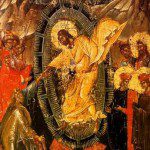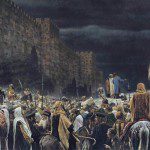When people reminisce fondly about childhood I often wonder how many social trials in the schoolyard they are airbrushing out. Kids can be brutal. I remember a group of girls who pointedly wouldn’t play jacks with me, kids whose lunchtime circles seemed impenetrable, giggling groups whose secrets I knew weren’t for me. I wasn’t an outcast; I had my own friends and a loving family and a church where I knew I belonged. I imagine, though, that everyone experiences exclusion in the course of growing up—some in prolonged and painful ways.
It may have been in the midst of one of those lonely periods that I first really took in Paul’s simple, strong words to the Corinthians as he admonished them against schisms over which leaders to follow: “. . . all belong to you, and you belong to Christ, and Christ belongs to God.” We live in a holy lineage. We are held in a circle of love like a circle of fire that burns bright and protects us in the night and warms us against deadly chill and illumines and beautifies each of us.
In light of that belonging, earthly experiences of exclusion can be tolerated, perhaps even received as teachings. It may be worth asking myself, when I feel excluded, “What does inclusion in this group or event mean to me? How might I be choosing to stay outside? What might I gain if I embraced exclusion as an invitation to healthy solitude or an opportunity to claim a new kind of freedom or an occasion to learn about my own deeper desires?” A view from the margin often provides an important perspective.
Life flourishes in particularly rich and complex ways at the margins of a stream or river—what biologists call the riparian zone. At that interface biodiversity flourishes; soil is enriched, and restored, water quality is improved. What happens in these zones influences surrounding woodlands, wetlands, and grasslands. They are a place of lively exchange where creatures of different orders meet one another. It is at the margins that life is most dynamic: creatures develop resilience in sudden and seasonal shifts and changes.
When we find ourselves at the margins we may become more resilient as well: more aware of paradox, more generous toward diverse points of view, more reflective about the boundaries we erect that determine our notions of belonging. People who live by the West Bank barrier or the Mexico-US barrier or on the other side of the tracks are daily faced with exclusion. They are more acutely aware than the rest of us of the problems we need to solve if there is to be peace. Walls and class boundaries incite violence and longing and challenging conversation. Who belongs where is a question that underlies most wars. We are having to face it in new ways as damaged and changed systems require that we recognize interdependence. We are having to find out, if we don’t already know it, how “insiders” depend on “outsiders,” how we belong to each other and to the earth and to Christ, who belongs to God.











